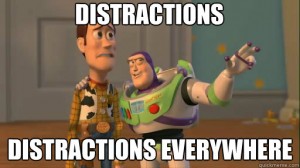
A year ago, fellow fictorian Kevin Cioffi wrote about starting a writing group, and I thought I would give my own advice on starting and existing within a writing group. I personally find that having a writing group provides one of the best benefits I could ask for, a deadline. I write for the joy of telling an awesome story, and that’s really about it. Without the weekly deadline, I find myself putting off my writing to pursue other hobbies. With a writing group, I know I have two weeks to finish the next chapter. If nothing else, that’s reason enough for me to find and stay in a writing group. So, lets say you take my advice and follow Kevins steps to find or create your own writing group, what steps can you take that will help both you and your group?
First, learn to step away from your work. This may be one of the hardest things to do, but when your work is being critiqued you should step back and stay silent. Pull out your notebook and write down what the other members talk about, but don’t defend your work! We all love our writing and we want to correct every misconception or issue that arises. If someone says something that is wildly different from what you meant, write it down and listen to everyone else. Wait to see what the other members of the group thought. If you need to, feel free to ask other members if they agree or how they felt about a section, but don’t stop the conversation or try to point it in a certain way. If you do this, you may give information that is crucial to later parts of the novel, which your group will understand but will be lost on any other reader. Use your common sense to give only as much info as needed and make sure your group makes the connections you wish.
Similar to the prior suggestion, be as detailed as you can when you read others works. I like to write emotions or idle thoughts in the margins as I read. I may not bring a lot of these thoughts up during the group meeting, but it might be useful to the author as he reads it after the fact. Something that I idly wrote down and didn’t think was important enough to bring up could have been the plot hole nobody noticed. If someone else mentions feeling odd about a certain point of the novel, I can respond with my feelings and give another point of view.
Feel free to experiment. Writing groups are the best place to try that bit of trickery that might not work. If it doesn’t work, you’ll know right away and maybe even get advice on how to fix or improve the idea. You’re all there for each other and you should feel comfortable around your group. If not, you might want to find/refine your group until you are.
Make sure you have something for every meeting. This may seem obvious, but you might get stuck on a chapter and have no clue how to precede. It happens to all of us, so be prepared and have other things to contribute. Take a character and write a small side story, or step away and write something wildly different. I’ve heard of two authors in a writing group who both got stuck so they switched novels for a week and wrote the others next chapter. It helped give ideas while keeping the creative juices flowing. As the mantra goes, keep writing!
Have fun. You want your writing groups to be something you look forward to. Prepare fun writing exorcizes to start each session or save extra time for word games. Bring food or drinks and enjoy the company of your friends. Make it an environment that keeps bringing you back.
The real goal of a writing group is to provide a forum for you to go over your work and receive feedback on the fly. You understand your novel more than anyone, but your writing group will provide your first real insight into what the rest of the world will think.
Have your own suggestions or experience with a writing group? Don’t agree with my suggestions? Add a comment below. I’m looking forward for more tips or suggestions that can improve my writing groups.




 There are many parts of creating a new novel, and creating realistic characters is probably one of the most challenging ones. Characters need to be believable. They need to have their own personality, habits, and traits that set them apart from others. If done correctly, the reader will be able to relate. They’ll understand and feel concerned. It’ll pull them deeper into the novel and they’ll keep reading to figure out what will happen. If done poorly, it will throw them out of the novel. They won’t be able to believe and before long, they’ll look elsewhere and leave your novel behind.
There are many parts of creating a new novel, and creating realistic characters is probably one of the most challenging ones. Characters need to be believable. They need to have their own personality, habits, and traits that set them apart from others. If done correctly, the reader will be able to relate. They’ll understand and feel concerned. It’ll pull them deeper into the novel and they’ll keep reading to figure out what will happen. If done poorly, it will throw them out of the novel. They won’t be able to believe and before long, they’ll look elsewhere and leave your novel behind.